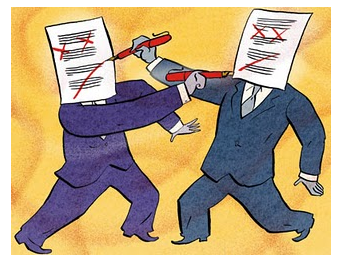Wall Street’s War
Congress looked serious about finance reform – until America’s biggest banks unleashed an army of 2,000 paid lobbyists
 By Matt Taibbi, The Rolling Stone
By Matt Taibbi, The Rolling Stone
This article originally appeared in RS 1106 from June 10, 2010.
It’s early May in Washington, and something very weird is in the air. As Chris Dodd, Harry Reid and the rest of the compulsive dealmakers in the Senate barrel toward the finish line of the Restoring American Financial Stability Act – the massive, year-in-the-making effort to clean up the Wall Street crime swamp – word starts to spread on Capitol Hill that somebody forgot to kill the important reforms in the bill. As of the first week in May, the legislation still contains aggressive measures that could cost once-indomitable behemoths like Goldman Sachs and JP Morgan Chase tens of billions of dollars. Somehow, the bill has escaped the usual Senate-whorehouse orgy of mutual back-scratching, fine-print compromises and freeway-wide loopholes that screw any chance of meaningful change.
The real shocker is a thing known among Senate insiders as "716." This section of an amendment would force America’s banking giants to either forgo their access to the public teat they receive through the Federal Reserve’s discount window, or give up the insanely risky, casino-style bets they’ve been making on derivatives. That means no more pawning off predatory interest-rate swaps on suckers in Greece, no more gathering balls of subprime shit into incomprehensible debt deals, no more getting idiot bookies like AIG to wrap the crappy mortgages in phony insurance. In short, 716 would take a chain saw to one of Wall Street’s most lucrative profit centers: Five of America’s biggest banks (Goldman, JP Morgan, Bank of America, Morgan Stanley and Citigroup) raked in some $30 billion in over-the-counter derivatives last year. By some estimates, more than half of JP Morgan’s trading revenue between 2006 and 2008 came from such derivatives. If 716 goes through, it would be a veritable Hiroshima to the era of greed.
"When I first heard about 716, I thought, ‘This is never gonna fly,’" says Adam White, a derivatives expert who has been among the most vocal advocates for reform. When I speak to him early in May, he sounds slightly befuddled, like he can’t believe his good fortune. "It’s funny," he says. "We keep waiting for the watering-down to take place – but we keep getting to the next hurdle, and it’s still staying strong."
In the weeks leading up to the vote on the reform bill, I hear one variation or another on this same theme from Senate insiders: that the usual process of chipping away at key legislation is not taking place with its customary dispatch, despite a full-court press by Wall Street. The financial-services industry has reportedly flooded the Capitol with more than 2,000 paid lobbyists; even veteran members are stunned by the intensity of the blitz. "They’re trying everything," says Sen. Sherrod Brown, a Democrat from Ohio. Wall Street’s army is especially imposing given that the main (really, the only) progressive coalition working the other side of the aisle, Americans for Financial Reform, has been in existence less than a year – and has just 60 unpaid "volunteer" lobbyists working the Senate halls.
The companies with the most at stake are particularly well-connected. The lobbying campaign for Goldman Sachs, for instance, is being headed up by a former top staffer for Rep. Barney Frank, Michael Paese, who is coordinating some 14 different lobbying firms to fight on Goldman’s behalf. The bank is also represented by Capitol Hill heavyweights like former House majority leader Dick Gephardt and former Reagan chief of staff Ken Duberstein. All told, there are at least 40 ex-staffers of the Senate Banking Committee – and even one former senator, Trent Lott – lobbying on behalf of Wall Street. Until the final weeks of the reform debate, however, it seemed that all these insiders were facing the prospect of a rare defeat – and they weren’t pleased. One lobbyist even complained to The Washington Post that the bill was being debated out in the open, on the Senate floor, instead of in a smoky backroom. "They’ve got to get this thing off the floor and into a reasonable, behind-the-scenes" discussion, he groused. "Let’s have a few wise fathers sit around the table in some quiet room" to work it out.
 As it neared the finish line, the Restoring American Financial Stability Act was almost unprecedentedly broad in scope, in some ways surpassing even the health care bill in size and societal impact. It would rein in $600 trillion in derivatives, create a giant new federal agency to protect financial consumers, open up the books of the Federal Reserve for the first time in history and perhaps even break up the so-called "Too Big to Fail" giants on Wall Street. The recent history of the U.S. Congress suggests that it was almost a given that they would f*ck up this one real shot at slaying the dragon of corruption that has been slowly devouring not just our economy but our whole way of life over the past 20 years. Yet with just weeks left in the nearly year-long process at hammering out this huge new law, the bad guys were still on the run. Even the senators themselves seemed surprised at what assholes they weren’t being. This new baby of theirs, finance reform, was going to be that one rare kid who made it out of the filth and the crime of the hood for everybody to be proud of.
As it neared the finish line, the Restoring American Financial Stability Act was almost unprecedentedly broad in scope, in some ways surpassing even the health care bill in size and societal impact. It would rein in $600 trillion in derivatives, create a giant new federal agency to protect financial consumers, open up the books of the Federal Reserve for the first time in history and perhaps even break up the so-called "Too Big to Fail" giants on Wall Street. The recent history of the U.S. Congress suggests that it was almost a given that they would f*ck up this one real shot at slaying the dragon of corruption that has been slowly devouring not just our economy but our whole way of life over the past 20 years. Yet with just weeks left in the nearly year-long process at hammering out this huge new law, the bad guys were still on the run. Even the senators themselves seemed surprised at what assholes they weren’t being. This new baby of theirs, finance reform, was going to be that one rare kid who made it out of the filth and the crime of the hood for everybody to be proud of.
Then reality set in.
Continue reading Matt Taibbi here.>>
Pictures from Jr. Deputy Accountant


